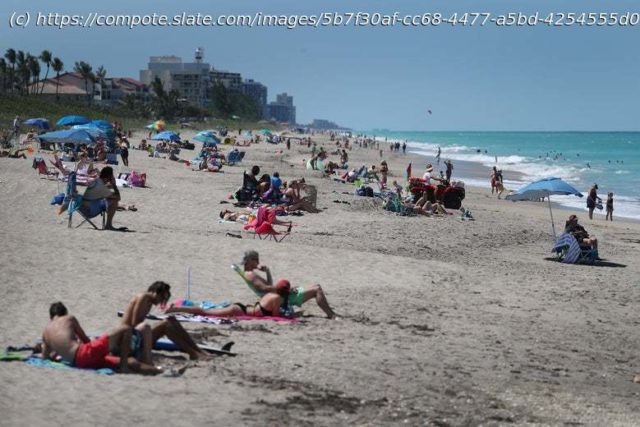Is it the weather?
Florida seemed headed for disaster: In the earliest days of the coronavirus epidemic in the U. S., throngs of rowdy spring breakers flocked to the state’s beaches and bars. Disney World, which draws visitors from around the globe, seemed a uniquely dangerous breeding ground. And the state’s demographics were worrying, given that Florida is chock-full of retirees in populous senior communities (Gov. Ron DeSantis has recently joked that Florida is “God’s waiting room”).
DeSantis, for his part, spouted off false information about the virus as he resisted increasingly urgent calls from experts and local leaders to take action. He refused to close the spring break gathering spots, allowing officials in South Florida to make their own decisions about restaurant and beach closures. He waited until April 1—two weeks after other states began closing their businesses—to issue a “safer-at-home” order. As Florida reported the first deaths on the East Coast, it seemed inevitable that the country’s third-largest state would join New York, Washington, and California as one of the pandemic’s regional hubs.
The disaster didn’t arrive, though. Florida hasn’t exactly been spared, and as of Tuesday, it has had more than 47,000 cases and more than 2,000 deaths. But the predictions had been dire: 465,000 Floridians hospitalized under the worst-case scenario, if social distancing measures were not enacted. If you rank states by the number of cases per capita, Florida is 32nd—just worse than California. (It’s 27th on the list of deaths per capita.) Despite many ominous signs about Florida’s handling of the coronavirus, the state appears to be doing, surprisingly, OK.
This has led people to speculate. Were fears overblown and DeSantis’ critics wrong? Could it be that Florida never needed to take the kinds of measures New York took? Is it just the weather?
According to one popular theory, that might be part of it: Floridians fared better because of the state’s tropical climate. Since COVID-19 emerged, scientists have wondered if the virus will experience seasonal fluctuations, dipping in the summer because it spreads less under hot and humid conditions. Some of the optimism is based on the behavior of flu viruses, which have a familiar seasonality. Similarly, Dr. George Rutherford, the head of the infectious disease and global epidemiology division at the University of California, San Francisco, said that human alpha coronaviruses—the ones that can cause common colds—peak in winter months. But no experts have claimed that the summer will save us.
A number of workingpapers suggest that the coronavirus does do worse under hot and humid conditions. “SARS-CoV-2 probably does have some temperatures it likes better,” said Dr. Larry Chang of Johns Hopkins Medicine. But, he added, “none of that is 100 percent, slam-dunk definitive.” Lab experiments have shown that the virus spreads more and survives better in cold and dry settings. Even with the flu and common cold, we don’t really understand the mechanisms that cause the viruses to stumble in the summer. But scientists have theories. SARS-CoV-2 is enveloped in a coat that may be broken down under heat or humidity, or under ultraviolet light from the sun, meaning it would no longer have the structure needed to be infectious. This degeneration also happens when it’s exposed to soap or just exists on its own for long enough.
Humidity, some experts have proposed, may also help because the virus is transmitted through droplets when you cough, breathe, or talk. One theory holds that in humid air, the virus-laden particles fall more quickly to the ground. Another theory says that low humidity can affect the respiratory tract’s cilia—microscopic structures that help clear dirt and mucus—thereby making us more susceptible to certain viral infections. Similarly, sunshine helps the body produce vitamin D, which may be connected with good health and resilience.
There’s another factor that generally helps summer slow the spread of disease: human behavior. People spend more time outdoors in the summer and less in enclosed spaces with other people.






